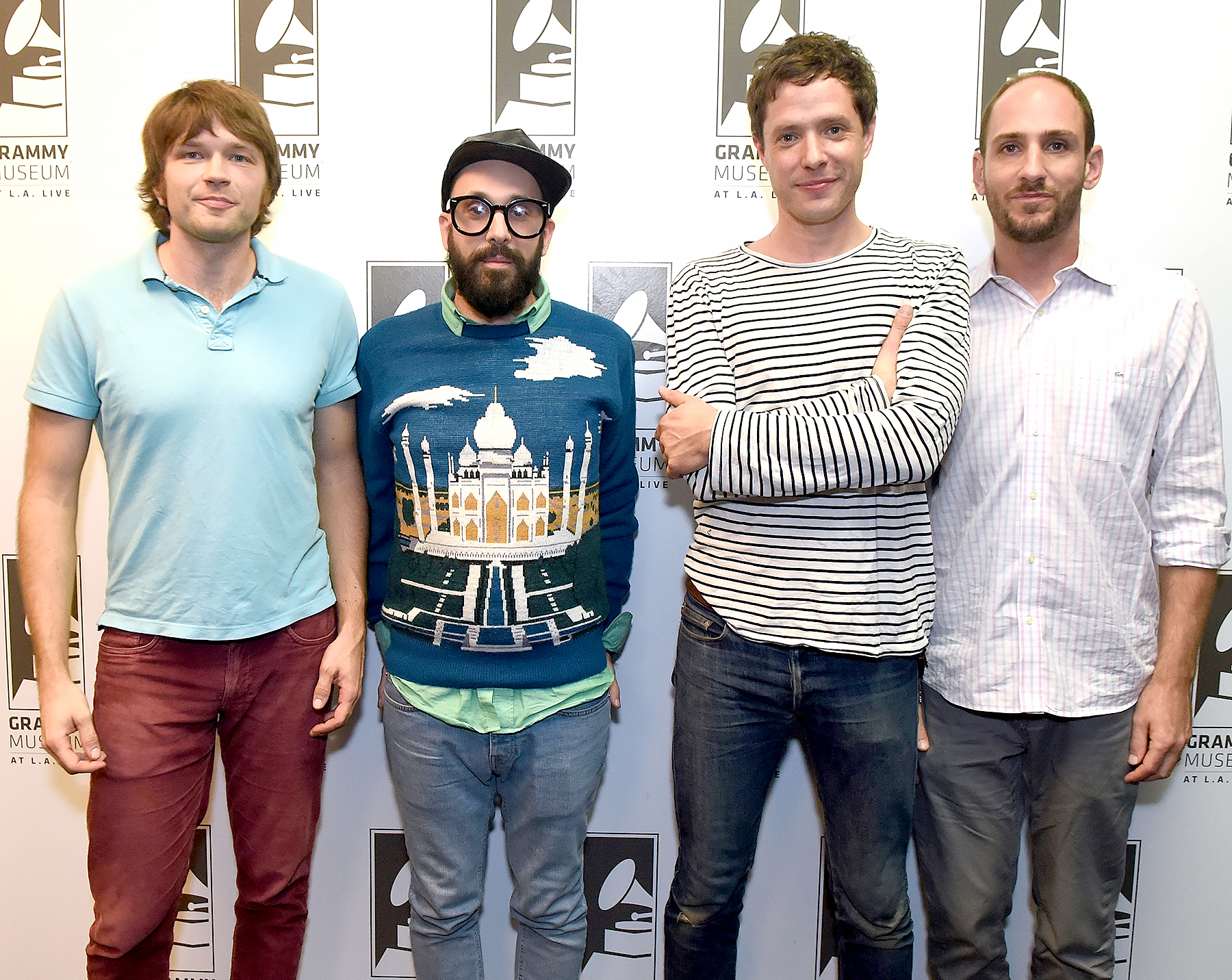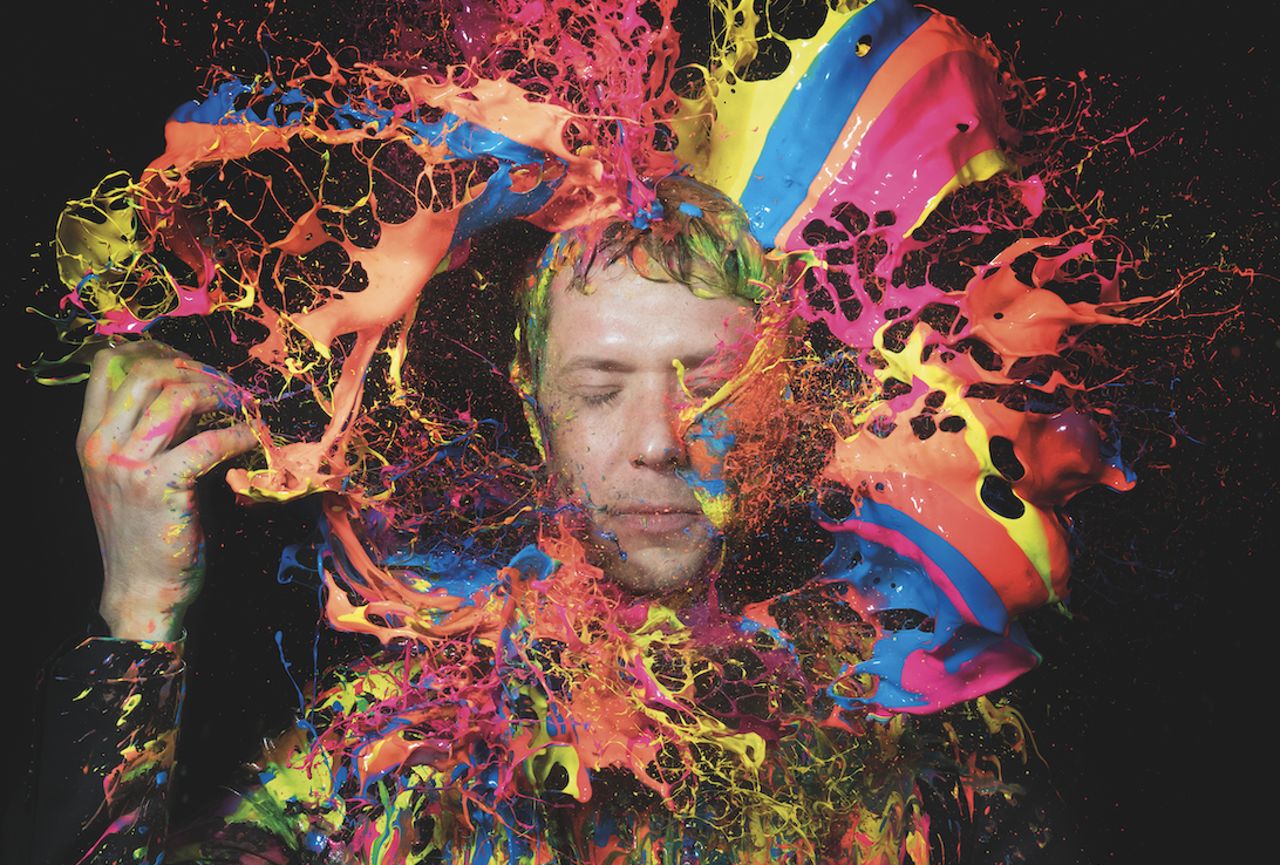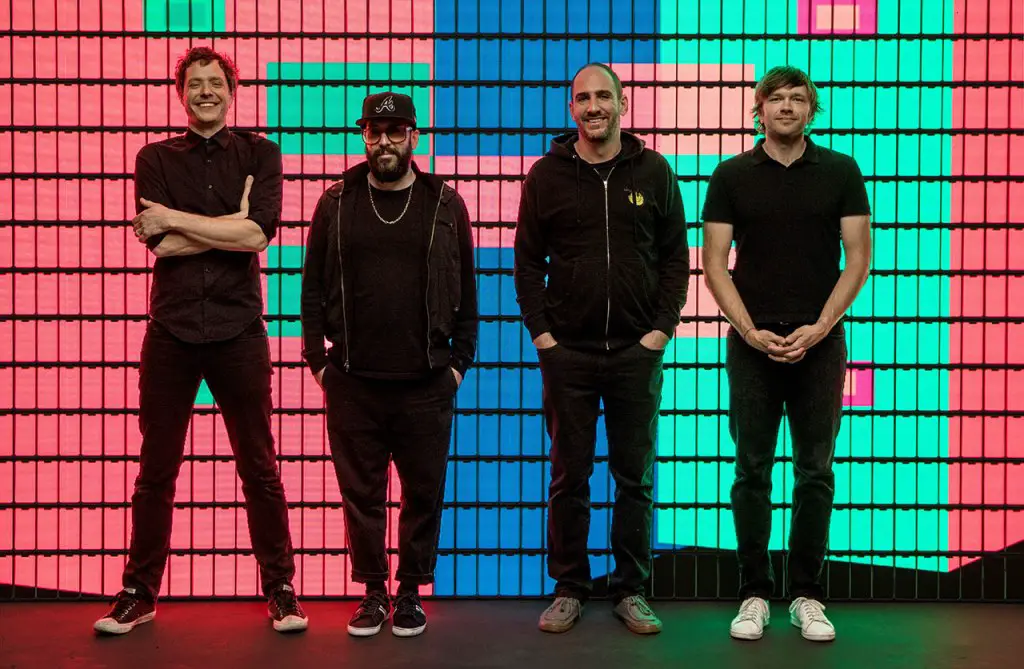All images courtesy of Mixed Media Works

These days, now more than ever, it’s important to take a stand. More so, you can’t just take a stand, but you need to truly stand for something. In an age that has come to be defined by the internet, social media, and angry people hiding behind fake user names, the lines between what is and isn’t are blurrier than ever. It’s hard to know what exactly is concrete anymore. There are a lot of gutless folks, who are spouting off obscene rhetoric that’s been rattling around the echo chambers they call a brain, but I digress. OK Go has been around for a long while. Early to mid-2000s Indie darlings turned older and wiser Alt-Rock vets with a message? Sounds about right. You may remember the band for their infectious 2005 hit, “Here It Goes Again.” You may remember them for the string of excellently-crafted albums since then. But if you’re going to remember them for anything, remember them for their message of hope and unity in this time of strife and division. Damian Kulash (the front person of OK Go) put on a wonderful acoustic rendition of the classic track by The Zombie “This Will Be Our Year” during the heart of this past election cycle.
Now, even if you don’t agree with the band’s politics, even if your heart is mostly ice and stone, even if you’re a malignant narcissist, I think we can all agree that this last year sucked, and the last four years, in general, weren’t really much better for a myriad of reasons. I know, this may be where I lose some people. This is where I get called a bleeding heart liberal. You know….one of those people who are supposedly “ruining this nation” or whatever. It’s fine. For what it’s worth, I do agree with Damian and OK Go’s politics. Furthermore, I commend them for their message, and for having the guts to put themselves out there, come what may. So, that’s what I am doing now because these days you can’t hide behind fake user names. If you want to enact positive change, you’ve got to own it. Today I’ve got Damian Kulash of OK Go with us. If you would like to learn more about the band and some of their new music, or their new EP This Will Be Our Year Lo-Fi vs. Hi-Fi, you can head over to their website here. This is a really good talk. Enjoy it. Cheers.
Andrew:
Damian, thank you for taking the time to speak with us. This last year has been rough, right? How are you holding up during this seemingly ever-raging dumpster fire?
Damian:
I’m fine. Me, my wife, and our 2-year-old twins had COVID almost a year ago now — we caught it last February — and there have been plenty of scary and stressful stretches. But we’re all still here, and what we’ve been through is nothing compared to the suffering so many have had to face.
Andrew:
Tell us about your backstory. What was your musical gateway so to speak?
Damian:
When I was about 7 years old, I heard “Rockit” by Herbie Hancock coming from a boombox on the shoulder of a “big kid.” My parents listened to a lot of music at home, but the sounds coming from that boombox scratched an itch I didn’t know I had, deep in my brain, and the sensation was completely unrelated to the experience I was familiar with from my parents’ stereo being on.
Later, I asked my dad what the song was. He had no idea, of course, but to his great credit, he took me to Tower Records, walked me up to the teenager in the singles department, and had me sing it to him. The guy was like, “Oh, that’s Rockit,” and I went home with my first 45. I literally wore it out.
Roughly 30 years later, OK Go was given the chance to play at President Obama’s 50th birthday party, and Herbie Hancock played, too. I was so excited to thank him for how that song changed my life. He seemed genuinely moved. He must get stories like that all the time, and I’m certain he’d never heard of me or OK Go before that night, but given the circumstances, it didn’t really matter. I was a guy living out the most unlikely fantasy, and he was the guy who’d planted that seed in me.
Andrew:
As a band, who are some of OK Go’s earliest and most important influences? How did the band develop its signature sound?
Damian:
Tim, our bassist, and I have been friends since we were 11. We met at summer camp and grew up in different cities so one of the main ways we stayed in touch was by sending mix tapes. We were (and are) both very broad in our tastes, so it’s kind of hard to pick specific touchstones. Our first summer together, the tapes I can recall trading back and forth were Run DMC’s King of Rock, Black Celebration by Depeche Mode, the Broadway cast recording of Les Miserables, Hey Jude, and the soundtrack to Pretty In Pink. By the time we were teenagers in the 90s, our mix-tapes were heavy on Fugazi and Mudhoney (and really the full catalogs of Dischord, SubPop, Merge, etc, because I grew up in DC in the Punk scene), and anything coming out of Manchester, England, because Tim had stumbled into The Stone Roses and Inspiral Carpets and was obsessed with that whole world. Then a lot of Pixies, Public Enemy, Zeppelin, and 90s Hip-Hop, especially from the Native Tongues universe.
I’m (pleasantly) surprised that we have a signature sound, for you. I feel like we’ve always been all over the place. So many of my all-time favorites are artists who have such consistent (and signature) styles, like Elliott Smith, Pixies, or any given decade of The Cure. I’ve always envied their clarity of vision — they know what they are, and what they’re trying to do. We, on the other hand, mostly write by surprising ourselves. So we’ll start a song thinking we’re making something quiet and intimate, and it turns out loud and screamy. Or we think we’re headed for a mod 70s thing and find ourselves in a world of synths and sequencers. But maybe it’s all just a lack of perspective — I’m sure there’s a sensibility running through it that’s invisible to me because I’ve never been outside it.

Andrew:
Let’s jump right in and talk about your new EP This Will Be Our Year Lo-Fi vs. Hi-Fi. What led to this reimaged version of your 2004 recording?
Damian:
The Biden campaign reached out to us and asked if we’d perform as part of their final push in November. This song, which has always been one of my absolute favorite songs, walks the narrow path of the message we felt good about sharing.
By comparison, in 2017 we released a cover of Morrissey’s “Interesting Drug” on inauguration day — also a long-time favorite which encapsulated everything in its first line: “There are some bad people on the rise!” We posted that song with a video laying out some of our worries about Mr. Trump, because part of me still believed back then (maybe just hoped?) that there was an ongoing public debate to contribute to by saying, “Hey everyone, here’s what we believe, and here’s why.” We knew we were mostly preaching to the choir, but there didn’t seem like much harm in that, and the argument we were making (“This man is dangerous!”) could still find a few more receptive minds, even if they was just around the margins. But by the time the Biden team called, we no longer labored under the delusion that a public political debate is really happening in America. Our political tribes live in different realities informed by different news sources and supported by mutually exclusive sets of “facts,” so preaching to the choir now feels more like part of the problem than part of the solution. The benefits of catharsis are more offset — maybe even outweighed — by the contribution to a general echo chamber of toxicity and rancor.
So, I recorded a solo version of “This Will Be Our Year” and dedicated it to everyone who *doesn’t* share our politics, hoping that it might be a gesture toward common ground. Everybody had a shitty year last year, so no matter what happened in November, we were all praying 2021 would be “our year” which “ took a long time to come.” I hoped that digging into the universal need for optimism might buy me enough goodwill from the part of our audience living in the other America to advocate for my views in a more quiet, respectful way which stood a chance (even a tiny one) of resonating beyond “the choir.”
With the election and the misery of 2020 receding in the rearview, we decided to re-release the performance with none of the politics attached. We didn’t want the song turning into an anthem of smug victory for those of us who were rooting for Biden. We wanted to follow through on the dedication and contribute (if it’s possible) to shared optimism for a shared future.
Andrew:
I’m a big fan of The Zombies. You must be too. How much of an influence have they been on OK Go as a band?
Damian:
Although I heard “Time of the Season” on the radio as a kid, I didn’t discover Odyssey and Oracle until I was in my 20s, and then it quickly became one of the most influential records in my life. In the two decades since I first heard it, I can’t think of a full album that has made such a big impact.
Andrew:
What is the artistic vision for the music of OK Go going forward? How has it changed since you started? How have you evolved?
Damian:
When we left Capitol Records and hired our first full-time employee, he astutely asked for some big picture direction: “Where are we trying to take this? What do you want to be doing in 5 years?” And, though I felt guilty providing the least useful imaginable answer, what I said then still holds: I want to keep being surprised. The only thing I can say with any confidence is that in five years I’d like to look back and go, “Wow, I definitely wasn’t expecting this.” So far, I think that’s been true of any given 5-year window of our career and I hope we’re lucky enough for it to continue. The only thing that feels like it’s been a fairly linear progression is our path from a narrow conception of what our job is (what is expected of bands, what type of things bands are allowed to make, what a “band” is, etc.) to a broader one that encompasses more “stuff.” In 1998 we definitely thought of ourselves in the well-defined categorical terms of the music industry we aspired to join. We were dudes who played instruments, and we wanted to tour and make albums, etc. We’ve gradually and progressively learned to think about our process abstractly enough that the instincts we used for navigating chords and melodies back then are now applied them to a much broader range of things — filmmaking, educational stuff, various projects in the general neighborhood of art and performance.

Andrew:
Tell us about your songwriting process. Do your lyrics come from a personal place, or are you merely telling stories so to speak?
Damian:
With a few exceptions, everything we’ve written starts with the music, as opposed to the lyrics. As a listener, what matters to me in music is the indescribable tangle of feelings that *only* music can give you — the scratching of the itch that Herbie Hancock did for me so long ago. And though words can be a huge part of that, they’re never sufficient on their own (for me, at least). So it’s always felt like there’s no point in starting with anything other than the sounds because until I stumble into a sonic combination that magically produces some incredible sensation in me, it’s not really “working” as music. So I struggle and struggle to build these balls of emotion that have no lyrics, and then when I get one I like, I’m stuck trying to reverse engineer lyrics into a melody. And then my first 10 passes at lyrics often flatten the magical ball into something really boring and pedantic.
All of this is to say that I really dread writing lyrics. Usually, I don’t feel connected to them unless they do come from a personal place, though there are exceptions.
Tim and I have been writing songs for a TV show, so the lyrical themes exist from the beginning of the process, and it feels like it flows much more effortlessly. So now I’m trying to convince myself to write more lyrics for OK Go songs in advance, and do the whole stumbling into surprise thing with them already in hand. We’ll see if it happens.
Andrew:
Touring is usually a huge part of a working band’s proverbial machine, but as we know, COVID has disallowed it. What do you miss most about touring?
Damian:
There are two things I like about touring, and everything else about it sucks.
1) The hour or two on stage, when I lose myself in something that is collective and intuitive. The part of me that wants to solve puzzles and overthink everything is quieted, and I love the pure limbic connection with the music and my friends and the crowd.
2) This is a distant second – I didn’t realize I (still) cared about this until I noticed the absence of it, this year: The clichés about “seeing the world” and the sense of perspective and wonder that one gets from travel are rooted in truth, but when you travel non-stop for years on end, that horizon-broadening plateaus, and it seems like whatever travel is supposed to achieve in your soul must have been accomplished.
But I’ve been surprised several times in the last few months to find how much my world has contracted again, or rather, how big and far away the rest of the world seems again. A drawing in one of my twin toddlers’ bedtime books keeps triggering an acute pang of nostalgia for a particular street corner in some midlands UK town; I’ve been on that corner trying to find dinner before a show half a dozen times in my life, and I can viscerally feel its shapes and volumes, and how utterly unlike Los Angeles they are — how far away that bubble of the universe is. But I can’t even remember if it’s Birmingham or Nottingham or Sheffield or Northampton, or wherever — I just remember the space itself, and I realize my own world doesn’t encompass that place the way it did two years ago.
Andrew:
One disturbing fact I’ve learned over time is that Spotify doesn’t pay artists well, if at all. What are your thoughts on that issue? How do we as fans do our part to help?
Damian:
It sucks, but it’s hard to combat. Like so many things, our preferences as consumers don’t line up well with our larger ideas about the world. No one wants to screw musicians, but everyone loves being able to access everything, everywhere. I wanted to play a De La Soul song for my kids the other day, and I couldn’t because it’s not licensed for streaming. Yes, I have it on vinyl somewhere, and CD somewhere else, and mp3 in several places, probably. But at that moment, I couldn’t fetch it from the ether, and I was completely perplexed. What do you mean I can’t listen to 3ft High and Rising? Is the world broken?
I assume the only thing that will help is regulatory action. Individual artists will never have the leverage to negotiate effectively with the entire distribution system, not to mention the entire public of consumers. But plenty of money is spent on music every year — the question is just how to fairly divide it up among so many stakeholders. That would be a super complicated puzzle even if greed, opportunism, and huge power imbalances weren’t involved. Which they are.

Andrew:
Are you into records? Tapes? CDs? Digital? Where do you like to shop for music?
Damian:
Because I’m the father of two extraordinarily-energetic little monsters, convenience and access time are all that really matter in my music listening habits these days. In the few circumstances that they’ll allow me to play anything other than their preferred playlist (62 different recordings of “Oh Susanna”), I can’t waste precious time searching through physical media, so I’m currently all streaming all the time.
I love my big shelves full of records and my Technics 1200, but they rarely get used.
Andrew:
What are a few albums that mean the most to you and why?
Damian:
Purple Rain by Prince
Both Either/Or and XO by Elliott Smith
Kick by INXS
Low End Theory by A Tribe Called Quest
A Boot and a Shoe by Sam Phillips
I’m Still In Love With You by Al Green
First Among Equals by The Equals (I think it’s actually a greatest hits)
Singles 45 and Under by Squeeze (definitely a greatest hits)
Dolittle by Pixies
One Night Stand: Live at the Harlem Sq Club by Sam Cooke
Ziggy Stardust by David Bowie
Pony Express Record by Shudder To Think
Frengers by Mew
I Just Can’t Stop It by English Beat
New Orleans Street Singer by Snooks Eaglin
I’m just trying to think of records that I like to listen to all the way through. So much listening in the last decade hasn’t been that — scattered and shuffled. And there are whole genres I’ve always listened to that way. Jazz, Reggae, and 60s and 70s Soul, for instance — even as a kid I mostly learned about them from compilations and mix-tapes, and now I tend to just dive into Desmond Dekker or Etta James by asking an algorithm to dig deeper. But all of the albums on the above list were or still are obsessive repeat records for me.
Andrew:
Last question. What advice would you have for young artists just starting out? How do they stay afloat in a world that seems to be so abhorrent to creatives?
Damian:
Make things because you love making them. It’s a wonderful blessing if you get to make a career of it, but it also takes the most precious joy and turns it into a job with expectations and letdowns and business politics and failures. The part that’s worthwhile — the grasping at alchemy and trying to coax something magical out of a bunch of sounds — that stuff never changes all that much, so if it stays a hobby for the rest of your life, you haven’t missed as much as you think. And paradoxically, you’re much more likely to actually find success if you’re making things because you love making them, as opposed to trying to “crack the code” or thread the needle of pop cultural relevance.
An idol of mine told me once to make the thing that only you can make. It’s deceptively difficult. Because it’s not, “Do it your own way.” It’s, “Figure out the place where your way doesn’t overlap with everyone else’s way and then sink your teeth into that.”

Interested in diving deeper into the work of OK Go? Check out the link below:
Dig this interview? Check out the full archives of Vinyl Writer Interviews, by Andrew Daly, here: www.vinylwritermusic.com/interview





Leave a Reply